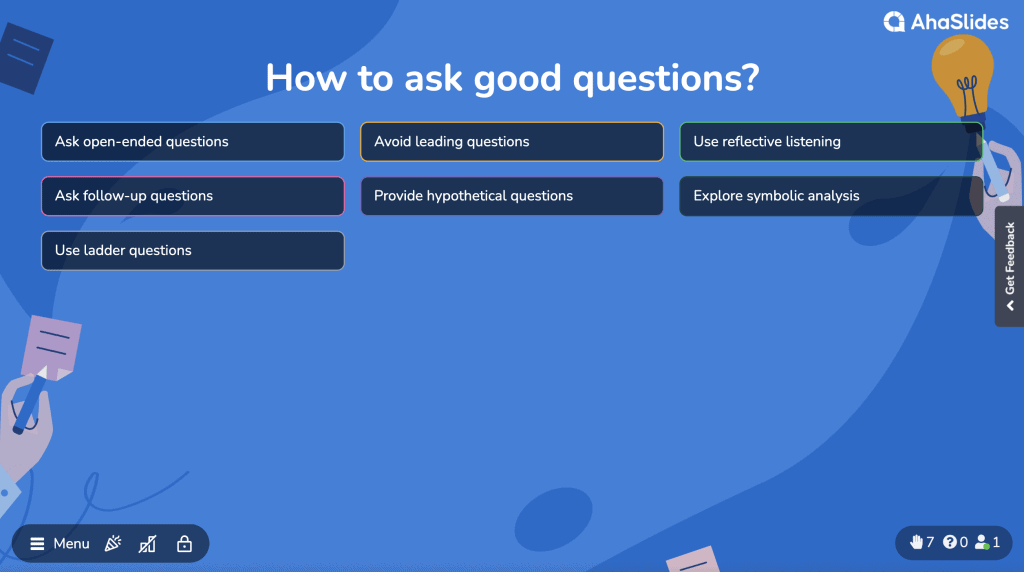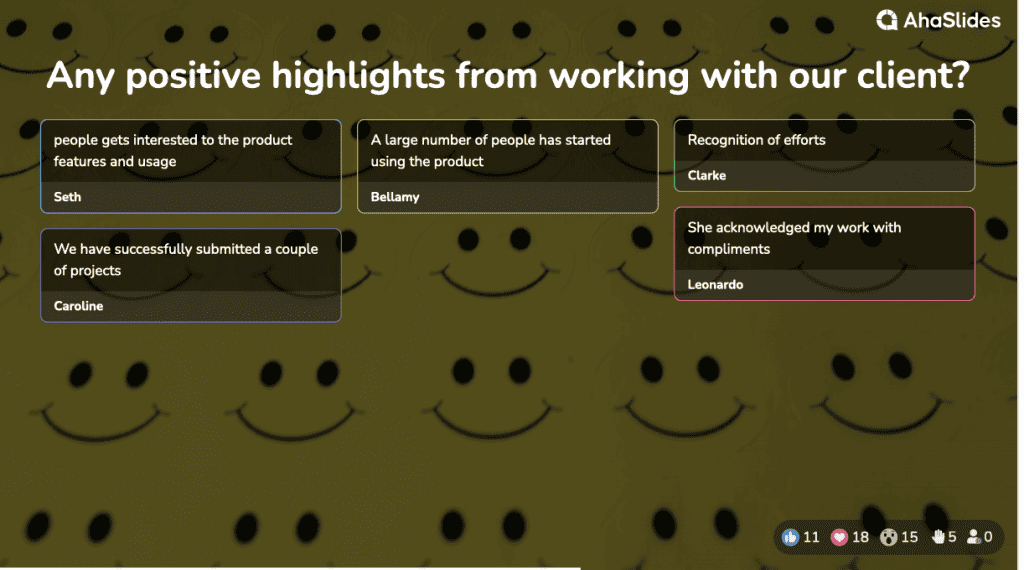徬徨 如何提問 適當地? 提出好問題需要比你想像的更多的努力。
說實話,跟陌生人搭訕有時真的讓人望而生畏。就像派對上的珍妮一樣,我們很多人都不知道該問什麼問題。 這不僅適用於社交場合,也適用於生活中發起對話很重要的各個方面。
在當今世界,許多人都不確定如何有效地提問。無論是跟進面試結果、問候某人的健康狀況,還是僅僅為了引發對話,提問的能力都至關重要。
本文深入探討了提問的力量、如何成為優秀的提問者,並探討了提升提問技巧的實用策略。

目錄
提高參與度的技巧
什麼是好問題?
您可能認為提出一個好的問題首先要尋找好的答案。 但首先, 一個簡潔明了的問題 是必須的。問題本身應該直奔主題,這樣你談話的人才不會感到困惑,並且能夠準確地理解你的意思。
其次,一個 好問題是相關的問題應該與正在討論的主題相關。提出不相關的問題可能會破壞對話或演講,浪費大家的時間。因此,確保你的問題與當前主題相關至關重要。
第三, 一個好問題是開放式的提問應該鼓勵討論,並允許多種答案。封閉式問題可以用簡單的「是」或「否」來回答,這可能會抑制對話,限制你所獲得的資訊。另一方面,開放式問題則鼓勵人們分享他們的觀點和想法,從而引導更深入、更有成效的討論。
最後, 一個很好的問題是一個參與 通過有趣和激發好奇心來吸引觀眾。 這些問題有能力創造一個積極和刺激的環境,鼓勵人們積極參與討論並分享他們獨特的見解和想法。 通過提出引人入勝的問題,您可以促進更富有成效和協作性的對話,從而加深對手頭主題的理解。
誰善於提問?
對於某些人來說,質疑很容易,而對於其他人來說,這具有挑戰性。 你有沒有想過為什麼有些人擅長提問,而另一些人卻很難? 事實證明,提出重要問題的能力是一項寶貴的技能,但並非每個人都具備。
例如,像心理學家這樣的專業人士以提出發人深省的問題的能力而聞名,這些問題會激發他們的客戶更深入地思考他們自己和他們的生活。 但是是什麼讓他們如此擅長呢?
將其作為一種策略方法,並檢查將一個人定義為優秀提問者的幾個特徵:

積極傾聽和善解人意的能力透過密切注意其他人的講話,您可以提出後續問題,以澄清和加深他們對聽眾情況的理解。
提出探究性問題的能力。 探究性問題是那些挑戰假設並鼓勵被詢問者批判性地思考他們的信念和觀點的問題。 一個好的提問者知道如何以非評判性和支持性的方式提出探究性問題,這有助於激發反思並促進個人成長。
勇於質疑 探索會帶來更深刻的洞見、理解和正面的改變。它需要帶著好奇心和開放的心態走出舒適區,在勇氣與敏感之間尋找平衡,並尊重被提問者。
如何在特定場景下提出致勝策略的問題
你人生中最難提問的時刻是什麼?如果你處於以下情況,不妨以此為靈感來源。如果不是,也不用擔心,所有你需要的提問技巧都在接下來的部分。
如何提問-如何讓別人和你交談
如果你想邀請別人和你聊天,務必清晰直接地表達,同時尊重他們的時間和界線。以下是一些你可以根據自身情況參考的例子。
- 我希望我們能聊聊(某個話題)。你願意找個時間跟我聊聊嗎?
- 我非常感激您對[具體問題]的見解和看法。有空的時候願意跟我聊聊嗎?
如何提問 – 如何尋求回饋
作為個人和職業成長的重要組成部分,我們經常向周圍的人、朋友、家人、同事和經理尋求回饋。 我們都想得到一個誠實和公開的答案,這裡有一個例子:
- 來自朋友或家人:“嘿[姓名],我很重視你的意見,希望你能就我正在做的新項目給我一些反饋。你覺得我有什麼可以改進的地方嗎?”
- 來自顧客或客戶:“尊敬的[客戶姓名],我們一直在尋求改進服務的方法,並希望聽到您對我們近期服務體驗的任何反饋。您有什麼特別喜歡或不喜歡的地方嗎?有什麼改進建議嗎?”
有關:
如何提問-如何在商業中提出正確的問題
如果您想在商業中提出正確的問題和明智的問題,那麼做出明智的決策並成功的結果至關重要。 以下是在工作場所提問的範例:
- 您能否舉例說明此解決方案如何適用於處於類似情況的其他客戶?
- 你用什麼指標來衡量這個項目的成功?
如何提問-如何透過電子郵件專業地提問
在電子郵件中以專業的方式提問時,請務必清晰、簡潔、尊重他人。以下是透過電子郵件以專業方式提問的良好範例:
- 澄清問題方式:感謝您發送報告。 我有一個關於 [特定部分] 的快速問題。 你能為我澄清[報告的特定部分]嗎?
- 信息性問題:希望這封電子郵件對您有所幫助。 我正在聯繫以請求有關 [主題] 的更多信息。 具體來說,我對[特定問題]感到好奇。 您能否提供有關此事的更多詳細信息?
如何提問-如何請人當你的導師
請某人做你的導師可能會令人生畏,但這也可能是向經驗豐富的人學習和成長的寶貴機會。 以下是如何邀請某人成為您的導師的示例:
- 直接聯繫:“嗨,[導師姓名],您的工作給我留下了深刻的印象,我很想學習您的經驗和專業知識。您願意做我的導師嗎?”
- 尋求指導:“嗨,[導師姓名],我的職業生涯正處於一個關鍵階段,需要一些經驗豐富的導師的指導。我非常欽佩您的工作,我認為您可以成為一位優秀的導師。您願意接受這個建議嗎?”
如何提問——如何詢問某人是否還好
如果你擔心某人,想問他們是否安好,那麼在談話中保持敏感和謹慎至關重要。以下例子或許對你有幫助:
- 我注意到你最近很安靜。有什麼想法想分享嗎?
- 你看起來最近過得很辛苦。如果你需要找人傾訴,或是只是想發洩一下,我隨時可以陪你。
相關新聞:
如何提問-如何申請面試
要求工作面試需要機智和專業的方法,展示你對這個職位的渴望和能力。 為了幫助您給人留下深刻印象,以下是一些有創意且有效的求職面試方式:
例如:
我很高興在上週的[活動/社交會議]上見到你,你對[行業/公司]的見解給我留下了深刻的印象。 我寫信是為了表達我對 [公司] 的持續興趣,並要求對任何相關的空缺職位進行面試。
我相信我的技能和經驗非常適合[公司],我很高興有機會與您進一步討論我的資格。 如果您願意安排與我面談,請告訴我您方便的時間。 我可以通過電話或親自與您交談,以您最方便的方式為準。
7 有效的提問技巧

有些情況下,你需要運用不同的提問技巧來找到你想要的資訊。如果你仍然不知道如何提問,以下是一些可以在正式和非正式場合使用的高效提問技巧:
#1。 問開放式問題開放式問題鼓勵受訪者分享更多信息,並有助於引出更深入的見解和理解。這類問題通常以「什麼」、「如何」或「為什麼」開頭。
#2。 避免誘導性問題:誘導性問題可能會影響回答,限制受訪者分享真實想法和感受的能力。避免提出暗示特定答案或預設特定觀點的問題。
#3。 使用反思性傾聽:反思性傾聽包括重複或轉述對方所說的話,以表明您已經聽到並理解他們的觀點。 這有助於建立信任並為開放式交流創造安全空間。
#4。 詢問後續問題:後續問題有助於澄清訊息,更深入地探討主題,並表明你積極參與對話。這些問題通常以「你能告訴我更多關於…的資訊嗎?」或「你說…是什麼意思?」開頭。
#5。 假設性問題:這類問題要求受訪者想像一個假設的情況,並根據該情況給予答案。例如,“如果…你會怎麼做?”
#6。 符號分析: Questions that focus on logical opposites, and attempt to learn what it is not, questions include “without”, ��not”, “no longer”,… can be used to explore different options and scenarios.
#7。 階梯式 可以成為探索潛在信念和價值觀的強大工具,並可以幫助您更好地理解他人的動機和觀點。 它在行銷和銷售中特別有用。
如何有效地提問: 7 條最佳建議
提問是有效溝通和獲取知識的關鍵。然而,提問並非隨便問,而是在正確的時間以正確的方式提出正確的問題。那麼,如何提問才能給他人留下正面而持久的印象呢?或者說,如何禮貌地提問?
創造一個有吸引力、誠實和開放的環境:有效的溝通是雙向的。 AhaSlides' 開放式平台 將點燃人們的頭腦,人們可以互相交換想法、提交並投票選出最好的想法。

定義你的目標:在提出任何問題之前,請明確您的目標以及實現這些目標所需的信息。 這將幫助您集中您的問題,避免將時間浪費在不相關的話題上。
避免假設不要妄加揣測你自以為知道什麼,或是你以為對方知道什麼。相反,要提出開放式的問題,鼓勵對方分享他們的想法和見解。
請明確點:提出可以用清晰、簡潔的信息回答的具體問題。 含糊不清或過於寬泛的問題會導致混亂和毫無成效的討論。
積極傾聽:提出正確的問題只是成功的一半。你也需要積極傾聽對方的回應。注意說話者的語氣、肢體語言以及他們回應的細微差別,以便更深入地理解他們的觀點。
積極和建設性地提出你的問題:避免使用消極的語言或指責的語氣,因為這會使人處於防御狀態並阻礙他們進行富有成效的對話。
保持專注:專注於手頭的話題,避免被不相關的問題分心。 如果您需要解決一個單獨的主題,請安排一個單獨的對話來討論它。
關鍵要點
對於如何提問,您現在可能有自己的答案和決定。 完全可以肯定的是,下次當你遇到需要開始質疑的情況時,你可能不再掙扎了。
常見問題(FAQ)
提問的好方法是什麼?
一次提出一個問題,並在需要時提供背景資訊。 體貼、投入和專注於理解體現在你提問的方式。
要問的 10 個問題是什麼?
1.你喜歡做什麼事情?
2. 你最喜歡的電影/電視節目是?
3.你最近學到了什麼?
4. 關於你的工作/學校,你最喜歡的是什麼?
5. 你童年最美好的回憶是什麼?
6. 你夢想的度假勝地是哪裡?
7. 你真正擅長的事是什麼?
8. 今年你想完成的一件事是什麼?
9. 你最喜歡的週末活動是什麼?
10. 現在你的生活中有什麼有趣的事情發生嗎?
你如何提出聰明的問題?
提出「為什麼」或「如何」的問題來獲得更深入的見解,而不僅僅是事實性的答案。 「你認為為什麼這樣做有效?」「你是如何解決這個問題的?」。參考說話者的評論或想法,以表明你正在積極傾聽。 “當你提到 X 時,它讓我想到了 Y 問題。”
參考: HBYR








